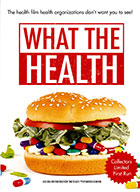
What the Health 2017
Distributed by Tugg, Inc., 855-321-8844
Produced by Kip Anderson and Keegan Kuhn
Directed by Kip Anderson and Keegan Kuhn
DVD , color, 97 min.
General Adult
Health, Nutrition
Date Entered: 08/17/2017
Reviewed by Brandon West, Social Sciences Librarian, State University of New York at GeneseoThis documentary examines the relationship between the food people eat, their health, and the politics that guide misinformed eating habits. On a descriptive level, this film sounds promising as nutritional impact on disease is a growing societal concern. Unfortunately, this “investigative documentary” plays out as ill-researched propaganda in support of plant-based diets.
When Kip Anderson, the film’s co-director and star, learns that processed and red meats are classified as carcinogenic by the World Health Organization, he begins to question the relationship between diet and health. He interviews medical doctors and people with debilitating illnesses to learn more about the impact of animal products on human health, with a focus on heart disease and diabetes. However, the film’s narrative loses focus when Anderson interjects cherry-picked facts to infer that pharmaceutical companies want to make people sick, and to infer a conspiracy between the United States government and animal product industries. While these are tantalizing topics, they detract from the exploration of diet and health, and end up hurting the credibility of the film since the conspiracies are poorly researched.
The film’s bigger issue is how the co-directors’ personal biases impede on the validity of the investigation. Anderson only interviews people who side with his perspective and he does not interview anyone with a dissenting opinion. When he reaches out to the American Heart Association to ask about the food recommendations on its website, he is unable to reach a representative who can answer his questions. Anderson uses this non-response to support his conspiracy-laden perspective. Anderson also interviews individuals who present symptoms of poor cardiovascular health. By the end of the film, these individuals are getting better simply by switching to a plant-based diet. The individuals’ health issues and recoveries are not validated by medical professionals. Finally, the co-directors employ correlational research to support their claims, but they use it as if it were causational—this may mislead the viewer.
The biggest takeaway from the film is that there needs to be more research and transparency regarding the way food impacts health. However, this film builds the argument around decontextualized statistics and propagates the idea that a plant-based diet is the cure all for many diseases. Ideas like this may hold some truth in certain circumstances, but disease is more complex than what is presented in this documentary. There are other documentaries about food and health that would better serve for academic library collections.